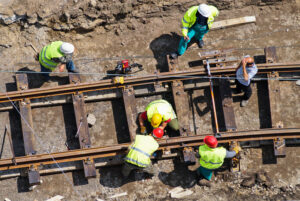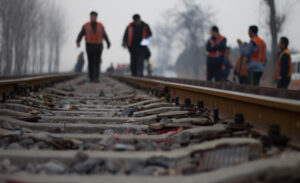The American Cancer Society (ACS) lists railroad workers among those with a high risk of asbestos exposure. Prior to the early 1980s, asbestos was used throughout the railroad industry for decades. Fortunately, railroad workers with mesothelioma or other asbestos-related diseases can pursue medical care and financial aid with help from our team of veterans advocates.
Why Are Railroad Workers At Risk of Mesothelioma?
Anyone who worked on railroads prior to the early 1980s is at high risk of developing mesothelioma since they may have been exposed to asbestos, the only known cause of this cancer.
 Asbestos was used to make trains and railroads as it was cheap, durable, flexible, and provided natural insulation and fireproofing. This substance is now known to cause cancer, but prior to the early 1980s, manufacturers of asbestos-based products hid the risks to make money.
Asbestos was used to make trains and railroads as it was cheap, durable, flexible, and provided natural insulation and fireproofing. This substance is now known to cause cancer, but prior to the early 1980s, manufacturers of asbestos-based products hid the risks to make money.
Asbestos-containing products used on railroads included:
- Equipment: Asbestos was found in cement used to make railroad ties, boilers, gaskets on engines, sealing cement, wallboards, and plaster.
- Insulation: Asbestos was used to insulate diesel and steam trains and to keep the boilers hot. Asbestos-containing insulation could also be found in the ceilings of cabooses and passenger cars, electrical panels, and the outside of the engines.
- Locomotive parts: Workers were exposed to asbestos found in train components like clutches, brake linings, brake pads, and floor tiles.
Railroad workers that inhaled or swallowed stray asbestos fibers that were released from these products could develop mesothelioma 10-50 years later. Thankfully, help is available if you're a former railroad employee who developed mesothelioma.
The Mesothelioma Veterans Center can help you access treatment from top doctors and compensation right now. Further, if you served your country and later got sick, we can help you file for benefits from the U.S. Department of Veterans Affairs (VA).
Start the process with our Free Veterans Packet.
Railroad Workers at Risk of Mesothelioma
Any railroad worker who came into contact with asbestos on a regular basis while they worked could be at risk of mesothelioma later in life. This cancer takes 10-50 years to develop after someone is exposed to asbestos.
There were many types of jobs in the railroading industry. If you served in any of the jobs listed below prior to the early 1980s, you may have been exposed to asbestos.
- Brakeman
- Conductor
- Construction worker
- Equipment operator
- Foreman
- Locomotive engineer
- Machinist
- Pipefitter
- Rail yard supervisor
- Signalman
- Station master
- Steam engine worker
- Welder
- Yardmaster
Arguably, those at the greatest risk of asbestos exposure were railroad workers who repaired, installed, or removed asbestos-containing materials.
For example, electricity, plumbing, heating, and cooling systems all needed to be maintained by equipment operators. Other workers were assigned to replace damaged railroad ties, rebuild worn-out roadbeds, and lay out new areas of railways.
But, many of these materials and systems used asbestos-based products like pipes and insulation. Simple maintenance duties could send asbestos fibers flying.
Railroad Workers & Secondhand Asbestos Exposure
Asbestos exposure didn't just put the railroad workers themselves at risk. In fact, many railroad workers' families were also in danger too due to secondhand asbestos exposure.
Some railroad workers brought asbestos that had gotten into their clothing back into their homes. The fibers could then enter the air in the home, putting the workers' loved ones in danger of mesothelioma later in life.
We can help if you or a loved one now has mesothelioma from railroad asbestos exposure. Contact our team today to learn more.
History of Asbestos Use on Railroads
Railroads became an important part of U.S. prosperity starting in the mid-to-late 1860s. Unfortunately, the deadly substance known as asbestos also came into regular use during this time.
By the 1930s, railroads and trains across the country greatly relied on asbestos since this material was quite durable and heat-resistant.
In particular, those who served aboard steam-powered trains were at a higher risk of asbestos exposure.
"Before the transition from steam to diesel-powered locomotives during the 1950s certain railroad workers had the opportunity for significant occupational exposure to asbestos. "
— American Journal of Industrial Medicine
The risks of asbestos became known to the general public in the early 1980s, and major studies were undertaken to assess the harm that had been done to railroad workers and those in other industries who were exposed.
Notably, a 1988 study published in the American Journal of Industrial Medicine found that mesothelioma accounted for 1 in 13 cancer deaths among railroad machinists who served between 1920 and 1929.
Modern-Day Risks of Asbestos on Railroads
 Railroads stopped relying on asbestos-containing products due to the inherent dangers in the 1980s. Most railroads and trains underwent asbestos abatement programs (meaning the dangerous asbestos products were removed or sealed).
Railroads stopped relying on asbestos-containing products due to the inherent dangers in the 1980s. Most railroads and trains underwent asbestos abatement programs (meaning the dangerous asbestos products were removed or sealed).
That said, it wasn't possible to remove all of the asbestos from railroads and locomotives. Thus, asbestos has continued to pose a threat to railroad workers even in the present day.
A staggering 41 miles of railroad track contaminated with asbestos around the town of Libby, Montana were finally deemed safe in 2022, according to the Environmental Protection Agency (EPA).
Libby was home to a mine, and ore laced with asbestos was shipped out of the town by railroad for decades. Cleanup efforts first began on Libby's railroad in 2004.
Also in 2022, a company owner was sentenced to 30 months in prison for conducting a botched restoration job on a rail car that contained asbestos. The restoration was never finished and 30 of his employees were exposed to asbestos since he didn't take steps to ensure their safety.
Railroad Asbestos Claims
Mesothelioma in railroad workers can be devastating. Thankfully, through private and military claims railroad workers can obtain compensation to cover medical bills and other expenses.
Explore the types of claims you can file following a mesothelioma diagnosis below.
Railroad Asbestos Settlement Claims
When it finally became clear that railroad workers were getting sick from asbestos — and that manufacturers knew the risks but said nothing — private claims began to be filed. Most railroad asbestos claims end in settlements.
The average mesothelioma settlement awards between $1 million and $1.4 million.
Railroad workers or their families can pursue compensation by filing a private claim and pursuing a railroad asbestos settlement with our team's help. Call (855) 272-6681 now to get started.
Asbestos Trust Fund Claims
Many makers of asbestos-containing products filed for bankruptcy to avoid lawsuits. However, it's still possible for railroad workers with mesothelioma to get money from these manufacturers through asbestos trust fund claims.
Bankrupt manufacturers of asbestos-based products had to put money aside to help those who were harmed if they wanted to stay in business. There's currently more than $30 billion available in these trusts today. Our team can help you access some of this money.
VA Benefits Claims
If you or a loved one was a railroad worker who served in the U.S. military, it's possible to file VA benefits claims for mesothelioma. With VA benefits, veterans with mesothelioma can receive monthly compensation worth nearly $4,000 in many cases and free or low-cost medical treatment.
Eric Hall (a U.S veteran and VA-accredited lawyer) can help you file for mesothelioma VA benefits right now.
Mesothelioma and Railroad Workers: Get Help Now
Railroad workers fighting mesothelioma deserve the best medical and financial help. Thankfully, that's just what they get when working with the Mesothelioma Veterans Center.
Our team can help anyone fighting mesothelioma:
- Connect with top doctors
- Get treatments faster
- Receive life-changing financial aid
- Secure VA benefits if they served in the military
Railroads were hotbeds of asbestos exposure for decades, and workers never deserved to get sick simply for doing their jobs. Our caring and dedicated team — made up of fellow veterans, patient advocates, and nursing support staff — will do all they can to assist you.
Start the process now by getting your Free Veterans Packet.
FAQs About Mesothelioma and Railroad Workers
Were railroad workers exposed to asbestos?
Yes. Anyone who worked on railroads before the early 1980s may have been exposed to asbestos, as this dangerous mineral could be found in:
- Cement
- Clutches
- Brakes
- Floor tiles
- Gaskets
- Insulation
- Plaster
These are not the only products that may have exposed railroad workers to asbestos. Contact your doctor immediately if you begin experiencing symptoms of an asbestos-related disease, even if you retired years ago.
Are train brakes still made of asbestos?
No. Train brakes are not made with asbestos in the present day due to the dangers that the material causes. That said, some older trains may still have brakes aboard that contain asbestos.
Proper precautions should always be taken if you work on an older train that was built before the 1980s — otherwise, you could be at risk of asbestos exposure.
Who is most likely to get mesothelioma among railroad workers?
Railroad workers who directly handled asbestos-containing materials like gaskets, boilers, insulation, and wallboard are at the highest risk of mesothelioma.
Working with or around asbestos-containing products significantly increases your risk of exposure and getting sick later in life.
What are the early warning signs of mesothelioma that former railroad workers should watch for?
If you are a former railroad worker who was exposed to asbestos, it's crucial to be aware of several early warning signs of mesothelioma.
Early mesothelioma symptoms of mesothelioma may include:
- Shortness of breath
- Chest pain
- Persistent cough
- Fatigue
- Loss of appetite and weight loss
- Night sweats
Help is available if you think you have developed mesothelioma or another asbestos-related disease from railroad work. Call (877) 450-8973 now.


